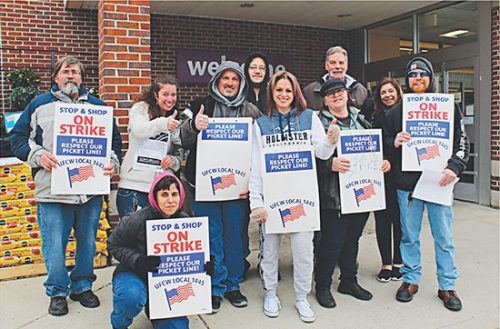Published April 18, 2019
By MAUREEN DOHERTY
NORTH READING — Dozens of North Reading Stop & Shop employees have been walking the picket line for the past week, after contract negotiations reached an impasse and 31,000 workers represented by five locals of the United Food & Commercial Workers (UFCW) union walked off the job.
As of 1 p.m. on April 11, the company went to limited store hours. The Stop & Shop at 265 Main Street is currently open 12 hours per day, from 8 a.m. to 8 p.m., but the striking workers have been met with plenty of solidarity throughout the weekend and an unwillingness by many to cross the picket line being maintained by the members of UFCW Local 1445.
Asked why they went on strike, a Union representative standing with the striking workers Friday afternoon told the Transcript, “This company is a billion dollar company. It’s very profitable. They’re from The Netherlands. They do not treat their workers in their country this way. These issues don’t come up.”
She explained that in the U.S.A., Stop & Shop is “fighting to have them pay (more for) healthcare. They don’t want to pay them fair wages. They want to tap into their pensions, which is very unjust. They want to take away their holidays, personal days and time-and-a-half.”

LONGTIME North Reading Stop & Shop employees are among the more than 31,000 employees walking the picket line since the afternoon of April 11. They’ve been working without a contract for several months. (Maureen Doherty Photo)
She declined to give her name because she said wanted to keep the focus on the workers and what they are up against. “These are our members and the fight is real,” she said. “We’re talking about minimum wage being at $12 an hour and a lot of these people do not make much more than that. Our job is to make sure that they get, at the very least, a fair contract. They work very hard. This company is a profitable company because of what these workers do.”
Another employee who has worked for Stop & Shop for over three decades explained that grandfathering their benefits over what the company wants to offer to the new hires will not work because, for example, even if he were to retain his ability to earn time-and-a-half on a Sunday or a holiday, if his new co-workers are being paid straight time eventually he will lose his hours to the new hires. He added that the company hires most of its workers at minimum wage.
Even though they get “paid holidays” under their current contract the store is only closed two days per year — Thanksgiving and Christmas — so they do work on those holidays, he said. One of the benefits the workers are fighting to keep is the ability to earn time-and-a-half when they are assigned to work those holidays and miss time away from their family and friends.
“What they want to do is those days wouldn’t be time-and-a-half. You’d have to work the holiday and you wouldn’t get paid better for it,” he said.
His union representative agreed. “Because it is going away in the state (of Massachusetts under the Grand Bargain legislation) what a lot of these retail companies are doing state-wide is taking a percentage away every year until it goes away in five (years). But because our workers are in a contract there is language that gives them that time-and-a-half as of today.”
She added, “They snuck that in there. They didn’t give these folks an option to vote. The state reps made an arrangement with the retail association and this was handed to them to give up their weekends, their holidays and family time to come and work for straight time.”
While this time-and-a-half benefit would be phased out in five years for existing employees, according to the current offer on the table, new employees will not be given the option to ever work for time-a-and-half.
Other matters on the table include the company seeking to discontinue a spouse’s access to the company health insurance plan if the spouse also works for an employer who offers it. This proposal is estimated to affect at least 1,000 families.
It had been reported by many news outlets that last year Stop & Shop made over $2 billion in profits and had benefitted from federal tax breaks last year in the hundreds of millions of dollars.
Faced with these factors, the employees have been left to wonder why the company would want to reduce the monthly pension benefit for many of their new full-time hires by 32% and reduce the pension earned by part-time workers by over 72% in addition to the increased out of pocket expenses for their health insurance premiums by nearly $900 per year for full-time employees and over $600 per for part-timers.
Over 75% of their workforce is comprised of part time help.
Also according to a statement issued yesterday by the Union, the shareholders of Ahold Delhaize voted on April 10 to give themselves an 11.1% raise in dividends, which would be equal to $880 million. The next day the strike became a reality. The shareholders should get their windfall before the end of the month.
On the first full day of the strike many customers were unaware it was taking place and many did return to their cars after the workers politely explained to them why they would prefer their picket line to be honored.
Technically the strike does not affect the in-store Citizens Bank branch, which remained opened. But by midday a striker said the branch eventually sent one of the tellers up to the other bank branch in Walmart Plaza to finish the shift since there were so few customers.



